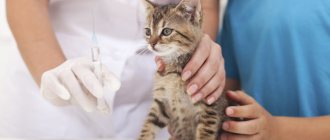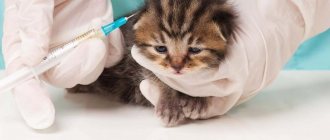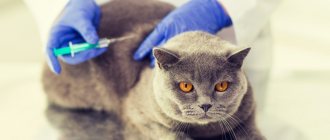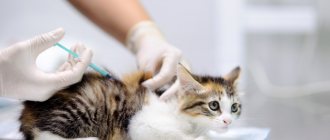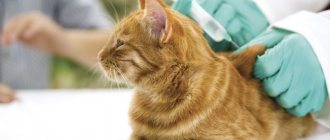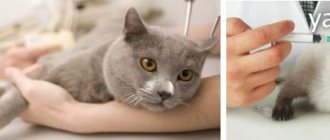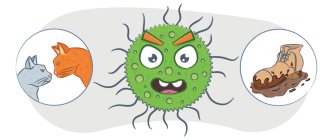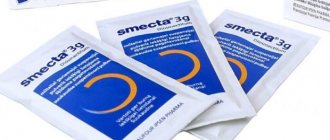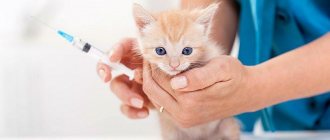Many generations of domestic cats lived without vaccinations and did not get sick. And some pets died, although death could have been easily prevented with a regular vaccination. Let's figure out whether Scottish kittens should be vaccinated, what kind of drugs they should be and when to inject them. Vaccination of Scottish kittens follows the same principles as representatives of other breeds.
Do Scottish kittens need to be vaccinated?
Vaccinations for Scottish Fold and Straight-eared cats are the same necessity as for any other breed. They are equally needed by a Scottish cat (Scottish Fold and Scottish Straight), an Angora cat, a Maine Coon cat, and a purebred animal, because the effect of vaccines on cats’ bodies is the same. Those. The information described below is suitable for both the Scottish Fold breed and others.
Article continues after advertisement
Whether your cat gets infected or not depends not only on his health, but also on chance. For example, the causative agent of distemper (panleukopenia) is carried into an apartment on shoes, is not washed off when washing the floor, is not killed by disinfectants and attacks the animal, leaving practically no chance for it not to get sick. There are other, less terrible, but also unpleasant infections. Therefore, the cases of families where cats lived for years without vaccinations should not become an example for you. It's more like luck.
Although anti-vaxxers will say that, on the contrary, vaccinations are not useful and do not protect against anything. In fact, the effectiveness of vaccinations has long been a proven fact. Another thing is that the cat’s body’s reaction to a particular vaccination may be different. Some cats have allergies and may react to the vaccine with laryngeal swelling, vomiting, diarrhea or itching. But such cases are rare, about 1%, and allergy symptoms are easily eliminated.
In most cases, the first few hours after vaccination, the cat may suffer from drowsiness, apathy, loss of appetite and lethargy. But this condition usually lasts no more than a day and is absolutely normal. At this time, the pet does not need to be disturbed: most likely, it will just sleep.
In addition, vaccinations are a prerequisite for traveling to other countries, because At the border, your pet will undergo veterinary control. That is why information about vaccinations is included in the veterinary passport, which is issued by the animal doctor. Keep this document.
Of course, there is also the material side of the issue. Vaccinations must be of high quality, and high-quality material costs money. Typically, one vaccination costs approximately $3-$10, depending on the manufacturer. But if you compare this figure with the check for the cat’s treatment, the amount is simply ridiculous.
What not to do after vaccination
Healthy children do not need to take any medications (antihistamines, antipyretics) after vaccination. On the day of the injection, it is not recommended to bathe the child; the next day you can wash without rubbing the injection site. In the first 2-3 days, you should not visit crowded places with your child (circus, cinema, shopping centers). It is important not to overheat or overcool the baby, and to dress according to the weather when walking.
In the next 2-3 days after the injection, there is no need to introduce new foods to rule out allergies; it is important not to overfeed the child and give plenty of fluids.
What vaccinations does a Scottish kitten need?
Vaccinations are given against the following infections: panleukopenia (distemper), rabies, feline chlamydia (not to be confused with human), rhinotracheitis, calicivirus, leukemia, infectious peritonitis, lichen, feline immunodeficiency, etc. Vaccination does not protect against infection 100%. However, if infection does occur, the risks of complications for the body will be minimal, even with plague. And, most likely, symptoms will not even appear.
What vaccinations are given to Scottish Fold and Straight-eared kittens in veterinary clinics and what vaccinations really need to be done are not exactly the same thing. Answering the question of what vaccinations a Scottish kitten must have, we will not name all of the ones listed below, but only panleukopenia, calicivirus and rhinotracheitis. Vaccination against rabies is also considered mandatory, but it is necessary, not always based on common sense, but because... This is required by law in most countries.
Panleukopenia (distemper)
Distemper is an extremely contagious and fatal disease. And vaccines against it are generally well tolerated. Therefore, it is definitely necessary to vaccinate an animal, even if it never leaves the house. After all, plague can be carried on shoes. In addition, this vaccine, according to the legislation of most countries, is mandatory.
Article continues after advertisement
Calicivirus infection
Calicivirus infection is a contagious respiratory disease with very unpleasant symptoms and a 30% chance of death. This virus is easily transmitted from one cat to another, so it is advisable to vaccinate against it. This vaccine should not cause any serious complications.
With regular revaccinations, it is better to administer different strains of this virus to cats that are not carriers of calicivirus (the strain is written in the description of the drug). This recommendation is due to the fact that the calicivirus mutates quickly. Injecting an outdated strain will help build immunity against a large number of similar strains, but many will remain undetected. Then, when encountering new strains, the cat may get sick, although it was previously vaccinated.
Rhinotracheitis
This unpleasant disease can be fatal. Therefore, the vaccine against rhinotracheitis is considered one of the main ones given to cats.
Rabies
By law, every owner is required to vaccinate their pet against rabies. However, in fact, this is mandatory for those who have access to the street or communicate with animals on the run. In other cases, it is necessary to weigh the risks of getting sick with the risks of complications after vaccination, because they are significant. In 4 cases per 10 thousand vaccinations after an injection against rabies, cats develop sarcoma (cancer). There are other, less dangerous, complications.
Feline leukosis
The leukemia vaccine is not safe or 100% effective, so you need to weigh the pros and cons before using it. Vaccination is recommended only for cats living in conditions with a high risk of infection: they roam freely on the street or live next to infected animals.
Chlamydia
Feline chlamydia (not to be confused with human chlamydia) causes inflammatory reactions. Vaccines against it protect not from infection, but from clinical manifestations of the disease. This vaccine, like the drug against leukemia, is recommended only for those cats that live next to already infected animals. The drug can cause a large number of unpleasant complications, and immunity from it is not stable. However, manufacturers persistently include this component in quadrivalent vaccines: panleukopenia + calicivirus infection + rhinotracheitis + chlamydia. It is the latter component that, as a rule, causes negative reactions from the cat’s body. If there are no infected people around your cat, choose trivalent vaccines instead.
Infectious peritonitis
Infectious peritonitis usually ends in death. Infection occurs through the fecal-oral route, but not all cats that receive the virus become ill. Those who do get sick will most likely die. There is currently no evidence that the peritonitis vaccine induces lasting immunity, so it is not recommended despite the seriousness of the disease.
Lichen
The vaccine against lichen also gained notoriety, because. There is no reliable evidence that it works long-term. But the injection for lichen causes many side effects. Therefore, such drugs are used mainly only in the treatment of lichen, but not for prevention.
Is it mandatory to vaccinate a Scot?
Many people believe that if a kitten does not go beyond the boundaries of the apartment, then vaccinations are completely unnecessary. One can argue with this opinion.
Regarding the broad-spectrum vaccine, it should be said that it prevents a fairly large number of infections and viruses. However, some cat owners are convinced that their pets are completely protected within the confines of an apartment or house. But it is worth noting that the owners themselves leave the apartment, go outside, and go to visit places where there are other pets or free-roaming animals.
This all leads to the fact that people themselves are able to bring the infection or virus directly into their home, for example on shoes, hands or clothes . In such conditions, a kitten or adult cat can easily become infected.
What about the rabies vaccine? Carriers of this virus are found both among wild animals and among domestic animals (street or homeless). Rabies is transmitted by a bite.
Where can your Scotsie get the rabies virus? For example: at animal shows; when moving or traveling; in case of mating; when visiting a veterinary center; if you have other, unvaccinated, free-roaming pets in your home. In addition, mice and rats with the rabies virus are rarely, but still found (this information is especially relevant for people who live in private homes).
© shutterstock
Of course, everyone decides for themselves whether their four-legged friend needs to be vaccinated or not, but by vaccinating a Scottish kitten, you thereby protect his life and health.
When to vaccinate a Scottish cat: schedule and calendar
Below you will see the vaccination schedule for Scottish kittens, and also learn about how the first vaccination takes place.
Article continues after advertisement
It is never too late to vaccinate a cat that has not been vaccinated before. That is, there is no age limit, except for very old pets. If your cat is not currently feeling unwell and her body temperature is normal, then vaccination can be done safely at any age.
If everything is done according to the rules, then folds and straights need to be vaccinated starting from the age of two months. When to vaccinate a Scottish kitten also depends on when its mother stopped feeding it. Within 1-1.5 months, mother's milk contains antibodies and kittens receive them along with milk. Of course, only if she is vaccinated or has already developed antibodies to certain infections. In the case when kittens up to 1.5 months old, feeding on mother's milk, are vaccinated, the vaccine most likely will not work. Therefore, ideally, the first vaccination for a Scottish kitten is given at 2 months from the breeder. It can also be postponed by 2.5-3 months, if there are prerequisites for this.
Conscientious breeders should give the baby to the buyer at 3 months with all vaccinations, but in practice this does not always happen. Often babies are given to buyers at 1-2 months. As a result, the cat gets stressed from the move, after which it can pick up an infection in the new home, without the protection of maternal antibodies. And some breeders, giving the animal away at 3-4 months, still did not give the necessary injections, not bothering with the question of when the kitten should be given the first vaccination so that it is safe.
Suppose you decide to buy an animal that they are trying to give away without vaccinations and early. The first thing you need to do is ask the breeder to keep the kitten for up to 3 months and get vaccinations. That is, the ideal option is for Scottish kittens to be vaccinated in the breeder’s home. However, some breeders increase the price due to such a request. Although it would be correct to include the cost of the drug when calculating the price of an animal. If you take a kitten not from a professional nursery, but simply from a family where they decided not to sterilize the cat, but to let her reproduce, they may not want to keep the kitten for that long at all, much less vaccinate it. If so, either refuse such a purchase, or vaccinations will have to be done in the new home.
Give the cat the first week or two to adapt to the new home, because it’s already stressful. And vaccinations can only be given to a strong organism, in no case in a state of adaptation. During the couple of weeks that the cat lives with you, try not to bring foreign objects into the house from the street, do not bring animals home (even if they are friends’ animals, vaccinated and clean), hide outdoor shoes and thoroughly wash the floors to reduce the risk of contracting infections, which you can bring from the street. If you carry out the quarantine correctly, then, among other things, you will protect the animal from a situation where it is already infected with something and is injected with a vaccine during the incubation period. This could end badly.
The question of when to give a kitten his first vaccination is closely related to when he was given an anthelmintic drug. While the cat is adapting, he needs to be given anthelmintics: this is required before vaccination. You will read more about expelling worms in another article. After deworming, you need to wait about 10 days so that you can get the vaccine.
About a week before and for a week after vaccination, physiological and emotional stress should be eliminated. These include moving to a new place, changing food, walking outside, and the appearance of a new tenant in the house. Is it possible to bathe a kitten before or after vaccination? Not worth it. This is a lot of stress for him. If you really need to, for example, the baby is very dirty, try not to wash the whole thing, but only the dirty area. If swimming is completely unavoidable, then do not do it at least on the day of vaccination and for a day or two after it.
It is advisable to administer the very first vaccines at home, that is, call a veterinarian to your place, rather than taking your pet to the clinic. The fact is that while the kitten does not have immunity, it is generally undesirable to take it out of the house. According to veterinarians, many people get sick on the way to their first vaccination.
There are two vaccinations. The first includes the prevention of the most terrible diseases - panleukopenia, calicivirus infection and viral rhinotracheitis: drugs Nobivac, Multifel-4, Felocell, etc. The second vaccination is done after the period specified in the instructions and consolidates the result of the first. After the first vaccination, the kitten does not yet receive full immunity; its body is just becoming familiar with the contents of the injection. After the second vaccine, lasting immunity is developed.
Article continues after advertisement
Vaccination for domestic cats
All animals, without exception, are at risk of contracting dangerous viral diseases. Moreover, not only kittens can suffer from illnesses, but also people living in the same house with the animal. Since only vaccination can protect a cat from diseases, veterinarians, first of all, advise pets to undergo it.
Many people are surprised to ask the question: is it possible for kittens to get infected if they have never been outside? The positive answer has the following explanation. For example, within the yard, some animal (no matter a cat or a dog) went to the toilet. His feces, containing the virus, were washed away by the rain and spread into puddles, the ground his owners once walked on. Dirt was brought into the house, and the furry baby could simply play with the laces and contract the disease.
Is annual revaccination necessary?
After a year, vaccination must be repeated. These are generally accepted norms in all countries. However, the MURKOTIKI website cannot help but tell readers about the heated debate between veterinarians regarding repeated vaccinations. Some believe that revaccination is mandatory, others say that immunity is developed for life. However, studies have confirmed that after some vaccinations immunity lasts for 3 years, and after others - for 7 years (this depends on the type of drug and the type of infection).
Veterinary immunology experts Ronald Schultz (University of Wisconsin) and Tom Phillips (Scrips Research Institute): “From an immunological point of view, there is virtually no justification for annual revaccination. Immunity to viruses lasts in animals for years or is even lifelong.”
Researcher at the University of California Veterinary Medicine Neils Pedersen, Doctor of Veterinary Medicine at the Canadian University Jean Dodds and many others agree with this opinion. They believe that repeated vaccination is not only useless, but can also be harmful to the pet’s health. According to them, there are known cases of the development of tumors and autoimmune diseases in overvaccinated animals.
One way or another, the instructions for the drugs indicate the officially recognized duration of action of a particular vaccine. For example, the Nobivac Rabies rabies vaccine and the Nobivac Tricat polyvalent vaccine indicate that immunity against viral rhinotracheitis and calicivirus lasts for 12 months, and against panleukopenia and rabies for 3 years. Interestingly, Nobivac Tricat includes active ingredients for three diseases at once. It turns out that it really doesn’t make sense to get vaccinated with the trivalent Nobivac Tricat every year. It makes sense to get vaccinated separately against rhinotracheitis and calicivirus, and inject yourself with a trivalent vaccine every three years.
The manufacturer of the quadrivalent vaccine Felocell insists that immunity lasts from 1 year. However, it is not possible to understand whether this means 12 months or, for example, 20 months, because the concept “at least” includes any figure greater than 1 year. Similar ambiguities can be observed with other vaccines.
Veterinarians believe that if you inject a vaccine while immunity from the previous one is still in effect, there is a high risk of complications. However, full-fledged studies on this topic have not yet been carried out. The official point of view is that revaccination should be done according to the instructions of the drug. The fact is that there is such a thing as immunity strength - the level of immunity to infection. So, this level is maximum within 12 months after vaccination, and then begins to subside. Therefore, in unfavorable conditions, which include post-Soviet countries, it is recommended to maintain a high level of immunity by vaccinating the animal once a year. However, in order not to guess, when planning revaccination, you can take a test for IgG antibodies to the infections you are interested in: if the analysis shows a high level of immune tension, it is advisable to wait with revaccination.
However, if you plan to leave the country with your animal, the new vaccine must still be noted in the veterinary passport, otherwise you will not be allowed to go abroad. The veterinary control at the border will not be interested in your opinion about the level of antibodies, etc. subtleties: it works according to the protocol.
Vaccinations depending on age
Formula-fed Scottish cats are given the first vaccine at 8 weeks. Breastfed babies have passive immune protection received from their mother's milk; such kittens are vaccinated at 12 weeks.
There are four types of viruses for which vaccinations are required, regardless of the cat’s habitat:
- rhinotracheitis (herpesvirus);
- panleukemia;
- calicivirus;
- rabies.
The first vaccination is carried out at 8-12 weeks with a polyvalent vaccine that forms immunity against several dangerous viruses. They give one injection.
The second vaccination is usually combined with a rabies vaccination, which is given at 12-14 weeks. In this case, one or two injections are given. The rabies injection is mixed with a complex vaccine or given as a separate injection. Revaccination of mandatory vaccinations is carried out every year, then repeated annually.
If the epidemiological situation in the area of residence is unfavorable, it is recommended to vaccinate a Scottish cat at 16 weeks against infectious peritonitis; the vaccine is re-administered after 20 weeks.
If a Scotsman plans to participate in exhibitions, travel abroad, or produce offspring, he must be vaccinated against chlamydia and leukemia at 8-12 weeks. A vaccine against trichophytosis and microsporia will help protect your pet and family members from ringworm when traveling and going to the country. The first injection is given at 8-12 weeks, the second after 10 weeks.
Contraindications for cat vaccination
Contraindications to vaccination are:
- poor health of the pet;
- period of teeth change (4-7 months);
- pregnancy (this is a contraindication for vaccination with live vaccines) and lactation;
- the presence of helminths or skin parasites (they must first be removed);
- antibiotic treatment;
- preoperative and postoperative period;
- state of stress.
Before vaccinating, the veterinarian must examine the animal, measure its temperature rectally (in the anus), and listen to the heart.
The site for Scottish cats “MURKOTIKI” recommends approaching the vaccination process with the utmost seriousness so as not to harm your pet. Let a competent veterinarian carry out deworming and vaccination; you should not try to do it yourself if you do not have experience caring for cats.
Preparation for MMR vaccination, carrying out
At the time of vaccination, the child must be absolutely healthy, without signs of acute respiratory viral infections, intestinal disorders, or allergies. If a child has had ARVI or another infection, at least 4 weeks must pass after recovery. 3 days before vaccination, you should avoid visiting crowded places and avoid contact with sick people. Source: N.V. Yuminova, E.O. Kontarova, N.V. Balaev, S.V. Artyushenko, N.A. Kontarov, N.V. Rossoshanskaya, E.S. Sidorenko, R.R. Gafarov, V.V. Zverev Vaccinal prevention of measles, mumps and rubella: objectives, problems and realities // Epidemiology and Vaccinal Prevention, 2011, No. 4(59), pp. 40-44
Before the vaccination is administered, an examination is carried out by a pediatrician. If in doubt, blood and urine tests may be ordered.
The doctor will tell you where the vaccination is given: before three years of age it is an intramuscular injection in the buttock, after three years - in the shoulder area.
The most famous brands of vaccinations
| VACCINE | INFECTIONS |
| Nobivac Tricat | viral rhinotracheitis, calicivirus, panleukopenia |
| NobivacRabies | rabies |
| Multifel | viral rhinotracheitis, calicivirus, panleukopenia, chlamydia |
| Vakderm | microsporia, trichophytosis |
| Eurifel | feline viral leukemia, viral rhinotracheitis, calicivirus, panleukopenia |
| Felovax | viral rhinotracheitis, calicivirus, panleukopenia, chlamydia |
| Microderm | microsporia, trichophytosis |
| Felocell | panleukopenia, calicivirosis, viral rhinotracheitis, chlamydia |
| Feligen | panleukopenia, calicivirus infection, viral rhinotracheitis and rabies |
| Chlamikon | chlamydia |
| Rabizin | rabies |
| Quadricate | rabies, panleukopenia, calicivirosis, rhinotracheitis |
| Purevax | panleukopenia, calicivirosis, rhinotracheitis, chlamydia |
Possible reactions and complications
The doctor will tell you in detail how the vaccine is tolerated, what kind of reaction to the vaccine is acceptable and when you should worry. After the injection, redness at the injection site and mild cold-like conditions are possible; in the period from 5 to 12 days, mild rashes are possible after vaccination. This is not dangerous; such a child’s reaction to the KKP vaccination is due to the fact that the injected viruses are live, weakened, and they imitate the infectious process in the body, stimulating the production of protective antibodies.
Possible side reactions and effects include allergic reactions, fever in the first 6-12 days. It is extremely rare that there may be more serious consequences and complications (thrombocytopenia, post-vaccination encephalitis), but all of them are likely in cases where contraindications are not taken into account.
Schedule
Absolutely all Scots, regardless of ear shape (Scottish Fold or Scottish Straight), need regular vaccinations. The age at which the first vaccination is given depends on the type of feeding the kitten is fed.
Babies who feed on mother's milk receive immunity from the cat, so they are given the first vaccination at 3 months. Kittens that have already switched to artificial feeding are vaccinated at the age of 2 months.
Revaccination is carried out according to schedule.
Vaccination schedule for Scottish kittens:
| Disease prevention | Age of primary vaccination (in weeks) | Revaccination | Subsequent vaccinations |
| Rhinotracheitis | 8-12 | After 21 days | Annually |
| Panleukopenia virus (distemper) | 8-12 | After 21 days | Annually |
| Calicivirus | 8-12 | After 21 days | Annually |
| Chlamydia | 8-12 | After 21 days | Annually |
| Rabies | 12-14 | Need not | Annually |
| Leukemia | 8 | After 12 weeks | Annually |
Major diseases requiring mandatory vaccination
Pedigree animals are more sensitive to viral infections, so vaccinations for British and other breeds are mandatory. Most often, owners encounter the following diseases:
- Panleukopenia, popularly called feline distemper
- Calcivirosis
- Rhinotracheitis
- Microsporia and trichophytosis are fungi that cause the development of ringworm, which can be dangerous for humans
- Rabies is a zoonotic, incurable disease that affects all mammals, including humans. In case of rabies, the mortality rate is 100%.
You should not hope that an animal that does not leave the house cannot become infected. The virus can be carried on clothes and shoes, and the causative agent of panleukopenia circulates freely in the air. The encapsulated distemper pathogen can remain dormant for many years; encountering the virus is extremely dangerous for young animals.
Which vaccine should I choose for a Scot?
Vaccines for Scots are either complex or single-component. Complex drugs include drugs against several diseases.
These include: “Nobivak Triket Trio”, “Purevax”, “Multifel 4”, “Felovax 4”.
Single-component products are used to prevent one infection:
- leukemia – “Leukocel 2”;
- rabies – “Nobivak Rabies”, “Rabizin”;
- lichen – “Microderm”;
- chlamydia – “Chlamydia”, “Katavac Chlamydia”.

